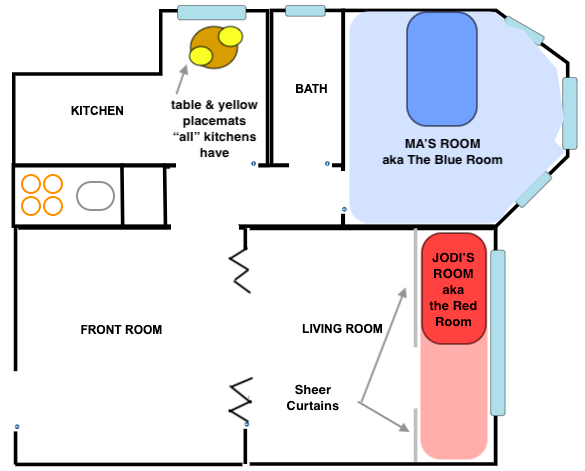
Somewhere between four and seven months old, infants develop an understanding that even if something or someone can no longer be seen, heard, touched, smelled or sensed, they may still exist. This is Piaget’s Object Permanence, Child Development 101, the why in why Peek-A-Boo is such a blast, why babies are surprised AF every time you appear again. Without object permanence, gone is for-good and for-ever.
Excluding studies on severe brain trauma, I found nothing about the other end of the spectrum, Object Impermanence in adults. The belief that when something or someone is out of sight or sound, that thing or person is simply…gone. If you’ve ever lived with or cared for someone with dementia, you know what I’m talking about. Ma, tired in the kitchen, wants to be driven home and do I know how to get there? I assure her I do, that I’ll get her home. As she steps out of the bathroom ready for our “trip home,” I call to her from the blue room–her bedroom. Stepping into the bedroom she’s slept in for more than two years, “This is my apartment! Did you know it was here all the time?”
But now, for her, the kitchen everyone has is gone.

I remember various psychedelics I ingested and enjoyed in the years spanning 1973 and 1990. (If you’ve never experienced hallucinogenic drugs, imagine living in an escape room with no clues, no solution, no instruction, or teammates, and that room constantly changes. Or never does.) Times I didn’t know what was real and what wasn’t. When people turned into other people before my eyes, here was not really here, or there, maybe here was everywhere. It could be exhausting. And exhilarating. Whatever it was, it was just a matter of hours before I’d be able to breathe “real” air again, before the ground beneath my feet would cease to move and once again everything and everyone would be back in their rightful, immutable place. The transient nature of those hallucinatory journeys allowed them to be fun, mind-blowing, consciousness-raising. Whatever they were, they were a choice and I knew I’d wind up back where I started, a little dirtier and kind of disheveled, but back on solid ground.
With dementia there is no end outside of The End. And it’s not a choice.
Ayahuasca, psilocybin, peyote, LSD, MDMA. A renewed interest in hallucinogens as solutions to a host of problems both psychological, emotional and spiritual has birthed an underground culture of paid “guides” to get you successfully through your trip. At fourteen or fifteen, I’d relied on other kids who’d tripped before to help if things suddenly made a sharp turn toward an unpleasantness and confusion. Someone to talk me “down.”
That’s what I do for my Ma, and although it’s been a slow going for me on this learning curve, luckily for her (and me!), she doesn’t remember the times I was a less than stellar guide. The days we walked back/forth, over/over, from the blue bedroom (hers) to the red room (mine) to prove we lived together. The minute she was in one room, she’d forget the other. The kitchen, its own ball of confusion because it seemed everyone had the exact same kitchen. It’s taken two years for her to get this bad, and for me to get good enough so when she wants to go home, I let her “discover” it herself.
“Wait, this is my home! Did you know it was here all the time? I don’t have to leave to go home, you do!” She worries it’s late, or raining, or I’m tired, and I wave it aside
“I’m not ready to leave yet. I’ll worry about it later, maybe I’ll sleep over if that’s okay.”
And the anxiety of how to get safely to our respective homes is gone and we relax with Everybody Loves Raymond or The Good Place, either of which I can lip sync every episode verbatim, while she has the advantage of seeing them for the “first time.” Our glass half-full of dementia.
Discover more from only the jodi
Subscribe to get the latest posts sent to your email.


Wonderful piece Jodi. It was hard taking care of my mother but in a much different way. She was sharp as a tack and could cut you down with a look. She was angry at the world and at the same time so afraid of dying. I had a hard time not telling her off or walking out. But because we love them we do our best for them. She passed 4 years ago in her sleep. As l waited for the funeral home to come I held her hand something she never would allow when she was alive and she looked totally at peace. Your journey is so much harder with your mother losing her quick wit and memories must be heartbreaking. You writings are inspirational. My sister in law mother is going through this also and I pass them on to her. They truly help. You are in my thoughts. Miss you. Cathy
I wish I could come over and watch one of those shows with y’all one day. What would Ma think?
Ha! She’d love the company and want to know if I like you “that” way. ?
This made me cry. I’m going through this with my own mother and it feels so lonely, like my best friend is gone, while this other simpler, beautiful, wide eyed child has taken her place. I love her so, and let her rediscover things every day as well. Seinfeld and Cheers are the two shows I know by heart, while she watches them anew night after night. Together we are trapped in some twisted version of Groundhog Day.
Exactly. When Mom wanted to watch Seinfeld, she’d ask for “Raymond, but Jewish. You know who I mean.”